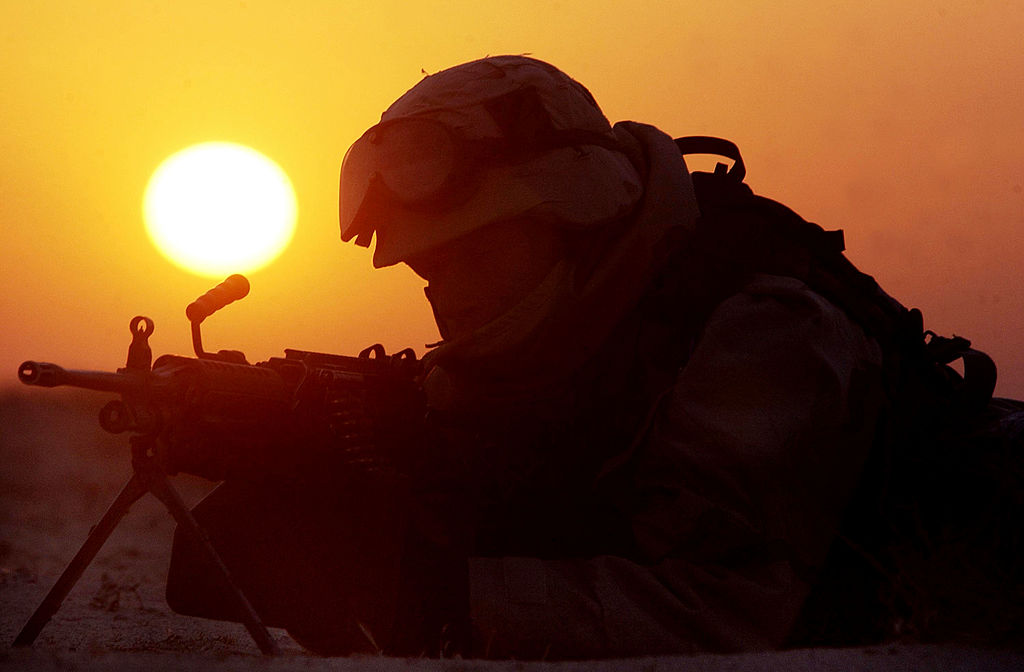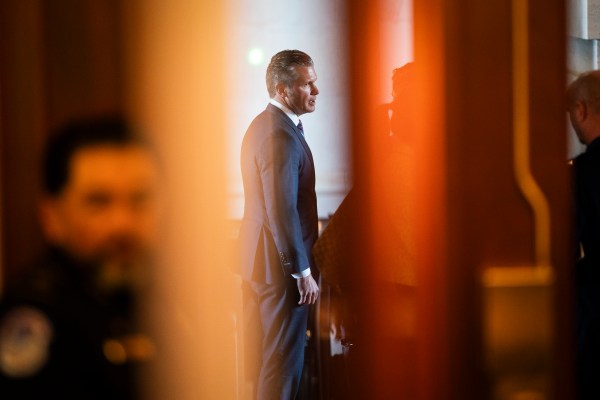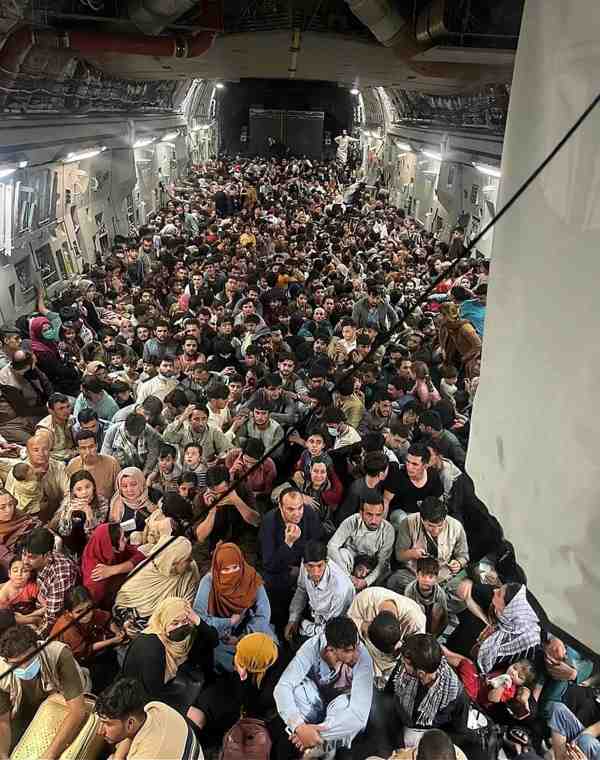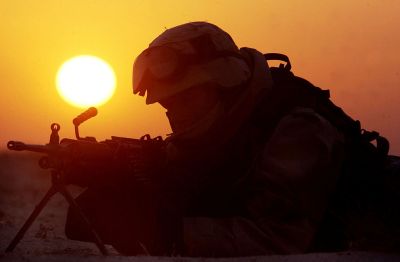BAGHDAD—Several years ago I posted a photo on social media of a beautiful sunrise over Karbala, Iraq. A close friend soon responded, “Keep your head down!” I had been sipping tea, in coat and tie, at the Lebanese restaurant on the roof of the Rotana hotel. Why on earth would I keep my head down? Unfortunately, the sense that Iraq is a dangerous, otherworldly place has not diminished among most Americans in the years since.
The truth is, 20 years after the American invasion of Iraq, neither country understands the other very well—even after decades of deeply intertwined history. Both sides are responsible for this tragedy, and it will take both sides deciding they want something different for the situation to change.
A lack of personal contact explains much of this misunderstanding. It is very difficult for an Iraqi to get a visa to fly to the United States. And relatively few Americans choose to visit Iraq, even though visas are now granted on arrival. The State Department maintains a Level 4 travel warning for Iraq—on par with Russia, Iran, and Afghanistan. This deters most Americans from even considering travel to the country. Yet it has been safe—provided you avoid known Islamic State strongholds, which I strongly recommend—for some years now.
Even though more than a million Americans spent time in Iraq since the invasion, few have real Iraqi friends. Likewise, few Iraqis have real American friends. Too few Americans learn Arabic, and too few Iraqis learn English. It remains difficult to move beyond stereotypes and prejudices if you don’t have direct experience with people of a different culture.
Americans, particularly those who served during the occupation, have difficulty picturing an Iraq in which personal safety is not a daily and overriding concern. It’s understandable, as one’s views of a particular place tend to remain frozen in the mind. Many military veterans, in particular, have issues moving past the group—Anbaris, Sadrists, Iranians—that they blame for the death of their friends. I lost close friends in Iraq as well, and I most definitely get that response. But it is a real obstacle to understanding.
I’ve only encountered such an inability to overcome prior experience one other time. While at a dinner party in Istanbul, I could not convince an Armenian who had attended Georgetown in the 1980s that 14th Street NW in Washington, D.C., was no longer the home of crack dealers and cheap prostitutes, photographic evidence notwithstanding. But the difference between misunderstanding a neighborhood and misunderstanding an entire country is a distinction of kind, not degree. And I fear that for most Americans—often including those who work professionally on Iraqi matters—the lack of personal experience with the reality of contemporary Iraq gives an incredibly distorted picture.
When talking with veterans—both military and civilian—of the various Iraqi interventions, I try to point out that (with rare exceptions) they’ve not really been to Iraq. You aren’t really seeing Iraq from a secured embassy, a forward operating base or combat outpost, an armored vehicle, or even in body armor with a rifle—let alone from behind a classified terminal. However necessary those defensive measures were, they prevented Americans from seeing Iraq as it is. Those who participated in the various phases of U.S. intervention in Iraq may know some of the sights and have experienced the weather, but the Iraq they knew is not the Iraq of today, even assuming that one managed an understanding of the Iraq of then.
I initially came to Iraq the same as every other American soldier. I didn’t know the people, didn’t understand the religion, barely knew the geography. These things improved over time, especially as I returned for my second military deployment, but there was still a huge barrier. It was not until I returned as a civilian, free from the security restrictions that prevent government employees from being in ordinary situations, that I began to really learn—and therefore befriend—the Iraqi people.
If you want to understand Iraq, get a visa, fly in on a commercial flight (via Amman, Dubai, Doha or Istanbul), get in a cab and try to see and understand—or at least begin to. It is a complicated place.
With rare exceptions, people can’t see the reality of a country when it is tearing itself apart with conflict. And Iraq has certainly known dark moments. The battles in Najaf, Baghdad, and Fallujah throughout 2004, perhaps perversely enabled by the speed of the initial 2003 invasion, provided a steady drumbeat showing an active resistance against the American presence. The incredible violence of the sectarian civil war between the Samarra Shrine bombing of February 2006 and the end of the surge in late 2007/early 2008 still haunts both witnesses and participants. ISIS captured so many of Iraq’s major cities in 2013 and 2014 that I was ridiculed when I publicly claimed in early 2015 that its defeat as an organized force in Iraq was inevitable.
Many of us still picture the carnage of those days, whether experienced personally or vicariously. Finding bodies on the street was routine in many neighborhoods during the civil war. But that aside, Iraqi citizens generally kept to their homes, many keeping their children home from school to avoid the carnage. My Iraqi friends usually describe that period as one of deep despair and isolation, if they didn’t just flee the country. Economic activity largely ground to a halt, or was performed with reckless disregard for personal safety. During the ISIS conflict, the combat on the front lines of “The Caliphate” was brutal, but so was life behind them, even if the majority of Iraqis lived in safe areas south of Baghdad. And too many of us, American and Iraqi alike, lost close friends or family members during that tragic period.
That period is gone. The infamous “corkscrew into Baghdad” as military planes would precipitiously drop from altitude to avoid surface to air missiles has now been replaced with a normally smooth descent and landing in a commercial jet. You pick up your luggage and take a taxi downtown as you would in any Arab city. And as I have watched Baghdad over the years—usually flying in three to six times a year—it has continued to grow and mature. This development is mostly encouraging but also brings very familiar concerns about urban sprawl and the loss of green spaces. Perversely, it was moving past the daily concerns of physical security that gave Iraq the mental and social space for the “Tishreen” movement of 2019, Iraq’s mini and quasi-successful color revolution.
Today’s Iraq is a very different place. New hotels, restaurants, and shopping malls pop up on a regular basis, and the problem with today’s Baghdad is not car bombs but traffic jams. The “airport road” that presented a continual security challenge during the occupation—there were 135 attacks alone in a four-month period from late 2004 to March 2005—has experienced exactly one fatal incident since 2011: the U.S. attack on Qassem Suleimani in January 2020. Nightlife is vibrant. There is a rapidly growing, if still nascent, startup and entrepreneurial ecosystem. And the sectarianism that defined the Iraqi civil war of (roughly) 2005-2008 is greatly diminished. Talk of belonging to a sect is a social faux pas, at least among the youth in Baghdad.
Lest this be dismissed as an overly rosy assessment, the usual list of problems remains. Successive governments have failed to provide basic infrastructure, leaving Iraq with major shortages of water and electricity. Corruption—exemplified in, but by no means limited to the recent $2.5 billion “heist of the century”—remains unsustainably high. Iran’s malign influence in the country, though often overstated, is nonetheless very real. The state has difficulty maintaining a monopoly on armed force, with party militias thriving all the way from the Kurdish north to the Shia south. Finally, the threat of violence within Iraq has shifted from conflict between Sunni, Shia, and Kurd to conflict within the Sunni, within the Shia, and within the Kurds. Tensions between the two major Kurdish parties in the north are as hot as they have been since the Iraqi Kurdish civil war of the mid 1990s, while the Arab Shia saw brief fighting between the Sadrists and the established “Framework” parties around government formation in August of last year.
The inability to understand Iraq in its current form also emphatically extends to the U.S. government. While the engagement of current U.S. Ambassador Alina Romanowski is a breath of fresh air, both the U.S. military and its diplomats labor generally from behind walls and checkpoints that make them inaccessible, and the Iraqi people inaccessible to them.
In one of the more amusing ironies of the U.S. history with Iraq, the U.S. embassy sits behind a checkpoint, guarded by the Iraqi military, through which a U.S. passport will not secure entry. So for even a U.S. citizen to access their own embassy is complicated, unless you’ve been in-country long enough to “make connections.” Personal contact between the U.S. government in Iraq and all but the highest crust of the Iraqi elite remains infrequent, despite the presence of 2,500 American service members around the country. As I have told successive U.S. ambassadors to Baghdad, in the absence of this contact by government officials, Americans who do visit have their opinions highly sought after. Iraqi officials seem to assess that even dated and perhaps biased information is better than no information. That there is so little official conflict that these workarounds remain necessary further illustrates the dearth.
All the assessments of Iraq’s importance in the world that led to the tragedies of 2003 remain correct. Iraq sits geographically at the important crossroads of ethnicity and sect in the region and continues to be a major and growing oil producer. Iraq’s current geopolitical weakness—driven primarily by a lack of institutional capacity—accentuates the power of its neighbors in the absence of their traditional counterbalance, permitting them more room to interfere in Iraq and elsewhere. The tired debates about whether the undeniable good of removing Saddam Hussein was worth the U.S. blood and treasure, the geopolitical vacuum that empowered Iran and others, the suffering of the Iraqi people and the damage to U.S. soft power is not one that will be solved today. But all that said, in Iraq—unlike Afghanistan, Libya, and Syria—there is something good happening here that could be built on and nurtured. And yet just at the moment when Iraq could become a friend, the United States seems to have moved on.
Without discounting the need to focus on China and Ukraine, fully enabling the relationship between Iraq and the United States remains an unfinished project, characterized by mutual misunderstanding. I have no easy answers for this multi-layered mutual inability to grasp the other, though more exchanges of any kind—cultural, artistic, educational—would certainly help.
Why Iraq is not marketing tours of “biblical” Ur, Babylon, and Nineveh to American Christians boggles my mind. But an understanding that our seeming familiarity with Iraq, whether from the news or a tour in combat, is largely illusory would be a good first point of reference. The first step is realizing we have a problem.






Please note that we at The Dispatch hold ourselves, our work, and our commenters to a higher standard than other places on the internet. We welcome comments that foster genuine debate or discussion—including comments critical of us or our work—but responses that include ad hominem attacks on fellow Dispatch members or are intended to stoke fear and anger may be moderated.
With your membership, you only have the ability to comment on The Morning Dispatch articles. Consider upgrading to join the conversation everywhere.